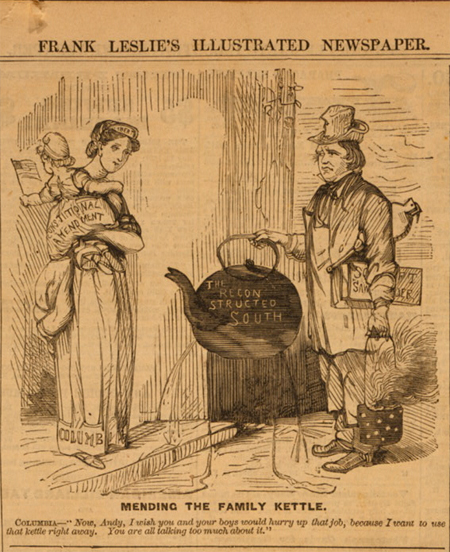Today in History: Fourteenth Amendment
Today in History–July 28–the Library of Congress features the Fourteenth Amendment of the Constitution of the United States. On this date in 1868, Secretary of State William Seward issued a proclamation certifying the ratification of the amendment. The 14th amendment granted citizenship to “all persons born or naturalized in the United States”, including former slaves freed after the Civil War. Referred to as one of the “Reconstruction Amendments”, this amendment also prohibits states from denying any person “life, liberty or property, without due process of law” and guarantees “any person within its jurisdiction the equal protection of the laws”. Find out more more about the subsequent judicial challenges based on the 14th amendment by visiting the Today in History section, then check out the resources below.
14th Amendment to the Constitution Was Ratified from America’s Library
Joint resolution proposing an amendment to the Constitution of the United States June 16, 1866
14th Amendment to the U.S. Constitution ratified July 9, 1868 (National Archives)
Presidential proclamation announcing ratification of the fourteenth amendment July 27, 1868
The Amendment to the Constitution 1866
The Equal Rights of All speech of Hon. Charles Sumner of Massachusetts in the United States Senate February 6 and 7, 1866
One country, one Constitution, and one people speech of Hon. John A. Bingham of Ohio in the House of representatives, February 28, 1866, in support of the proposed amendment to enforce the bill of rights
Enforcement of Fourteenth Amendment speech of Hon. Horatio C. Burchard of Illinois in the House of Representatives April 7, 1871
Select historical newspaper articles
- “The Constitutional Amendment Passed by the House” The Sun (New York [N.Y.]) June 14, 1866
- “The President on the Amendment” The Daily Phoenix (Columbia, S.C.), June 24 1866
- “Reconstruction: Ratification of the Fourteenth Amendment” New-York Tribune (New York [N.Y.]) July 20, 1868
- Fourteenth Amendment Cleveland Gazette 12/24/1898
- Judge Crumpacker Pleading the Enforcement of the Fourteenth Amendment 01/11/1902
1868 historical newspaper articles related to the Fourteenth Amendment
More historical newspaper articles related to the Fourteenth Amendment
Suffrage conferred by the Fourteenth amendment Woman’s suffrage in the Supreme court of the District of Columbia, in general term, October, 1871. Sara J. Spencer vs. The Board of registration, and Sarah E. Webster vs. The judges of election. Argument of the counsel for the plaintiffs. With the opinions of the court
The fourteenth amendment to the Constitution considered dissenting opinions of Mr. Justice Field, Mr. Justice Bradley, and Mr. Justice Swayne, of U.S. Supreme Court, in the New Orleans slaughter-house cases 1873
Negro suffrage : should the fourteenth and fifteenth amendments be repealed? Speech of Hon. Edward De V. Morrell, of Pennsylvania, in the House of Representatives Monday, April 4, 1904
Modern-day legislation related to the 14th Amendment
Citizen U multi-dicisplinary civics lessons
- The Magna Carta: Due Process from King John to the 14th Amendment and Beyond Emerging America
- Race, the 14th Amendment and Equal Protection Citizen U CRF

